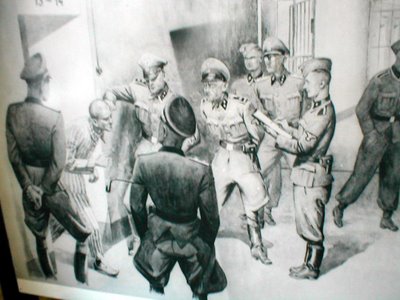
[Nazi torture implements. From Museum of World War II.]
It wasn't exactly a coincidence that my Adbusters piece earlier this year on fascism and the American right ran in the magazine's issue on torture. Though the piece doesn't specifically discuss torture, the subject of the piece -- "Is right-wing America becoming fascist?" -- constitutes the bottom line of the ramifications of the emergence of the United States as a bona fide torture state.
It's not that torture is unique to fascism. It has, after all, been around since the Dark Ages, and remained alive as a component of theocratic and feudal states for centuries. Certainly it has always been a commonplace feature of communist regimes as well, with the Soviets and Chinese providing abundant examples. What can be said generally is that torture is a feature of totalitarianism, regardless of its content.
But it occupies a unique position in the fascist ideological hierarchy, which is, after all, not so much a cohesive ideology but a multifaceted pathology. What makes fascism so potent on a personal level is its psychosexual component, expressed mostly as a desire to purge "unhealthy" elements through eliminationist violence, including the control of the body of the Other, and the ability to inflict purgative pain and suffering on that body. (For more on this, see Klaus Theweleit's study of this aspect of fascism, Male Fantasies, especially Vol. II.)

Fascists are particularly fond of torture because it represents such a complete expression of the fascist will to power. So when a nation adopts torture as an officially condoned policy -- as the United States has just done -- it immediately raises the specter that, indeed, it may be descending into the fascist abyss.
Tristero made this point the other day in typically straightforward fashion. And while I'm not quite ready to reach his conclusion -- that we are now living in a fascist state -- I do think that Sept. 28, 2006, will wind up as a benchmark date in our gradual but steady march toward that end.
It's not just the legalization of torture that raises this specter; it's how it came about. Namely, this policy was adopted, and sold both to the public and Congress, specifically as (A) a response to an insurmountable threat so great that it required "going beyond" the previously accepted norms of wartime behavior, (B)an express capitulation to the wartime powers of President Bush, contingent upon his superior judgment and instincts, ceding him illimitable powers beyond any known precedent, and (C) a bit of pre-election political theater specifically designed to portray liberals and Democrats as likely sympathizers who were "soft" on terrorists, and played that way by the president himself.
There really was only one hope of derailing this legislation, and it was contingent on the profoundly moral aspect of the torture question, to wit: Is torture an American value? Similarly, is it a Christian value?
Certainly we heard some voices -- notably Hillary Clinton's -- making a forceful case that torture is antithetical to American values. And we heard from a handful of liberal Christians decrying torture as anathema to their values as well. But they were too few and received too little attention from a media prone to playing down these issues.
In contrast, the Christian right was wholly silent on the moral aspects of torturing terrorist suspects, and instead offered up such homilies to the torture bill as this from Rev. Louis Sheldon of the Traditional Values Coalition:
- "We need to clarify this policy for treating detainees," said Rev. Sheldon. "As it stands right now, the military and intelligence experts interrogating these terrorists are in much greater danger than the terrorists. Civil suits against our military personnel are tying their hands as they try to get vital information which will save the lives of our young military people and the innocent."
"Our rules for interrogation need to catch-up with this awful new form of war that is being fought against all of us and the free world. The post-World War II standards do not apply to this new war.
"We must redefine how our lawful society treats those who have nothing but contempt for the law and rely on terrorizing the innocent to accomplish their objectives. The lines must be redrawn and then we must pursue these criminals as quickly and as aggressively as the law permits.
"And since this debate is, at its very core, about preserving the traditional value of prosecuting injustice and protecting the innocent, TVC will score this vote in both the House and the Senate. We encourage all of our supporters and affiliated churches to contact their elected representatives and let them know we support President Bush's efforts to update our methods of interrogating terrorist detainees in order to provide greater protection for our troops and the innocent."
As it happened, of course, it was precisely this twisted version of "traditional values" which carried the day -- and carried the nation over the edge of the abyss.
What's noteworthy about these exhortations, and all the similar defenses raised on behalf of the legislation, is how thoroughly they reflect key components of the fascist pathology. Consider, if you will, Robert O. Paxton's nine "mobilizing passions" of fascism described in his Anatomy of Fascism (and detailed here) as a kind of descriptive checklist:
- -- a sense of overwhelming crisis beyond the reach of any traditional solutions;
Check. The rationale for accepting torture is predicated on the claim that terrorism represents a uniquely malevolent existential threat to America.
- -- the primacy of the group, toward which one has duties superior to every right, whether universal or individual, and the subordination of the individual to it;
Check. The thrust of the Bush torture bill was that individual civil rights needed to be subordinated to the cause of "protecting" the larger public.
- -- the belief that one's group is a victim, a sentiment which justifies any action, without legal or moral limits, against the group's enemies, both internal and external;
Check. It's OK to torture terrorists, according to the Republican proponents of the law, because they killed 3,000 Americans on Sept. 11, just in case you forgot. All the government wants to do is keep them from doing it again, and any means at our disposal is jusitifiable to achieve that end.
- -- dread of the group's decline under the corrosive effect of individualistic liberalism, class conflict, and alien influences;
Check, at least to the extent that the torture law is being justified as a matter of "preserving our way of life," and defending against alien terrorists, while the legislation's opponents are dismissed as treasonous liberal sympathizers.
- -- the need for closer integration of a purer community, by consent if possible, or by exclusionary violence if necessary;
Check, at least to the extent that torture is a form of exclusionary violence intended to weed out "terrorist" elements and preserve the purer community.
- -- the need for authority by natural leaders (always male), culminating in a national chief who alone is capable of incarnating the group's destiny;
Check, Big Time. It is astonishing, really, just how broad-ranging are the powers President Bush will have acquired if this legislation survives its inevitable court tests. Moreover, the public is constantly admonished not to question Bush's basic decency when it comes to granting him powers typically only granted to totalitarians. Of course he wouldn't apply these powers to ordinary citizens. And five years ago, he similarly assured us that of course he wouldn't seek wiretaps without a warrant.
- -- the superiority of the leader's instincts over abstract and universal reason;
Check. Double megadittoes, Rush.
- -- the beauty of violence and the efficacy of will, when they are devoted to the group's success;
Check. Torture is specifically part of an aesthetic of violence, and is the ultimate expression of the desire to impose your will upon another.
- -- the right of the chosen people to dominate others without restraint from any kind of human or divine law, right being decided by the sole criterion of the group's prowess in a Darwinian struggle.
Check. Damn the Geneva Conventions, foll torture ahead! Moral and legal restraints? Phah! They are inconsequential when it comes to dealing with evil terrorists who respect neither the law nor morality. Our lack of morality is justified by theirs.
The utility of torture to fascist states can be found in other studies of the phenomenon. It's clear that legal torture reflects a disdain for the importance of human rights, identification of scapegoats, and an obsession with national security, all components of Lawrence Britt's 14 common characteristics of fascism. Likewise, it's a clear-cut expression of the fascist contempt for the weak, as well as the distrust of reason and celebration of action for action's sake, all attributes of fascism as described by Umberto Eco.
The appearance of legal torture as part of the American landscape is a profound change, and certainly signals the approach of the totalitarian state, though it may not herald its actual arrival. And considering that a right-wing regime is involved, discussing the specter of fascism is not only appropriate but necessary.
Even if it does not signal the actual arrival of fascism, it's the clearest warning sign of its approach yet. Torture is a quintessentially fascist act; codifying it means that the massive brick in the wall that it represents has been plunked into place. And it's the kind of brick that can be the cornerstone of a massive national pathology of apocalyptic proportions.
After all, they have always had ways of making us talk. Now they have the legal power to do so too.
Note, if you will, how I concluded the Adbusters piece:
- To the extent that the nation finds itself in the throes of a real crisis of governance; that we demand utter fealty to the national identity, even at the expense of civil liberties, democratic institutions, or democracy itself; that we identify liberalism as the root of all evil in America, as a domestic enemy little distinguishable from those from abroad; that we justify acts of monstrousness by pointing to our own victimhood; that we rely on the "strength" and instincts of our leaders instead of their wisdom and powers of reason, and grant them near-totalitarian powers (particularly in "wartime") in the process; that we allow violence to become part of the political landscape; and that we pursue an insane apocalyptic vision of world domination -- then, to that same extent, we put flesh to the fascist bones and make it real.
Sadly, the nation took a signficant step towards fulfilling many of the conditions described in that warning. We now not only live in a torture state, but to become that we have suspended the Writ of Habeas Corpus and granted the president unprecedented powers to decide the fate of anyone it chooses to designate an "enemy combatant." And in bulldozing its way to victory, the administration and its propagandists ceaselessly identified liberals with the enemy.
The chief reason we can say that this is not yet genuine fascism is because the latter only arises in a democracy in a state of crisis, following a significant period of decay. There has not yet been a real crisis of governance, which is most likely to arise in our system of democracy as a constitutional crisis.
Unfortunately, this administration seems determined, in its mad rush to power, to spark just such a crisis.
No comments:
Post a Comment